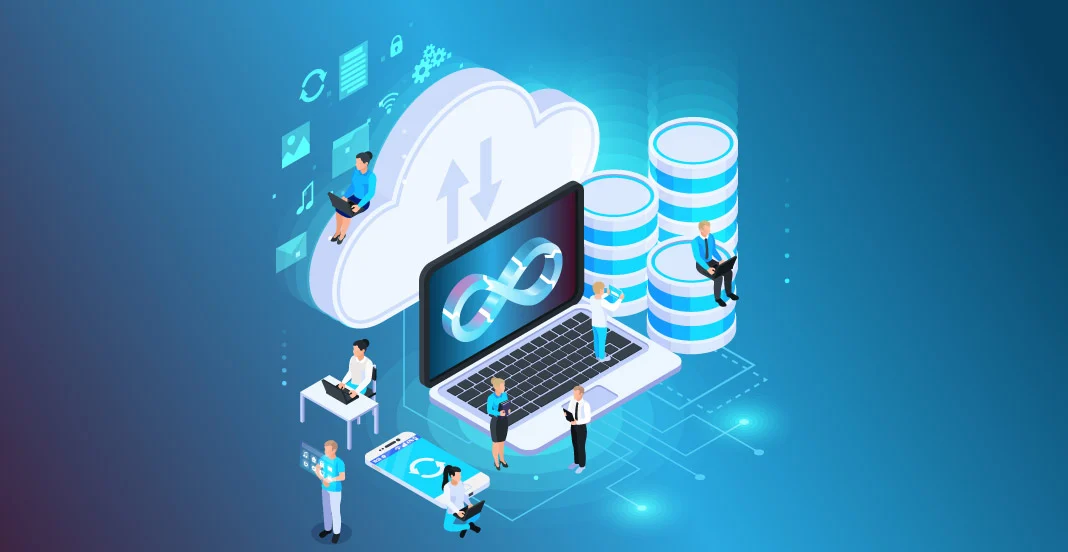Boost the Software by Integrating AI into DevOps


The world of software development has seen a remarkable transformation in recent years, driven by the increasing integration of Artificial Intelligence (AI) with DevOps practices. DevOps, short for Development and Operations, is a set of practices and cultural philosophies aimed at streamlining and automating software development and IT operations. AI, on the other hand, is revolutionizing various industries with its ability to process and analyze vast amounts of data, make predictions, and automate tasks that were once time-consuming for humans.
The convergence of AI and DevOps has given rise to a new paradigm, where intelligent integration plays a pivotal role in enhancing software development processes. In this article, we will explore how AI is changing the landscape of DevOps and examine the ways in which intelligent integration is revolutionizing software development. We will also discuss the benefits, challenges, and future prospects of this exciting fusion.
What is Intelligent Integration?
Intelligent integration represents a modern approach to data processing, harnessing the capabilities of artificial intelligence (AI) and machine learning (ML) to revolutionize digital integration tasks. This innovative paradigm offers dynamic solutions to traditional integration challenges, such as time-consuming processes, manual errors, and the inability to handle extensive data volumes.
At its core, intelligent integration relies on the prowess of AI and ML algorithms. These algorithms empower systems not only to automate routine tasks but also to make intricate decisions based on data-driven patterns and insights.
Consider for a moment the complexity of an average business transaction, traversing through more than 40 backend systems, each equipped with its unique set of APIs and business logic. When an integration issue arises, tracing the source of the problem can be a Herculean task for an individual and a cumbersome endeavor even for entire teams.
Take, for instance, an e-commerce business operating across multiple online platforms. Conventional integration methods for synchronizing inventories across these platforms often entail labor-intensive processes prone to errors. However, intelligent integration steps in to streamline and automate this ordeal. The system not only ensures real-time inventory synchronization but can also forecast future stock requirements based on historical sales patterns.
Intelligent integration transcends mere data merging and task automation. It aspires to create an intelligent ecosystem where disparate systems communicate seamlessly, enabling organizations to swiftly and accurately derive meaningful insights. This transformative approach aids businesses in making informed strategic decisions, enhancing operational efficiency, reducing costs associated with manual errors, and ultimately fostering business growth.
Consider the exciting prospect of incorporating AI into the development cycle, where it not only intelligently automates tasks but also predicts potential pain points before they manifest. Imagine an AI-driven code interpreter serving as the first line of defense, conducting code tests for common flaws and providing quick summaries of potential issues without requiring human intervention.
While code reviews are a vital part of the development process, they become increasingly challenging as project size and complexity grow. An intermediary AI step could automatically filter common issues, heuristically assess if coding standards are met, and thus relieve the workload on human reviewers. This empowers reviewers to dedicate more time to addressing critical issues, ultimately enhancing code quality and development efficiency.
The possibilities are boundless, and we have only begun to scratch the surface of what intelligent integration can offer. With AI at its core, this transformative approach not only simplifies and streamlines integration processes but also opens doors to predictive insights and enhanced decision-making, ultimately paving the way for a more efficient and intelligent digital ecosystem.
Key Features of Intelligent Integration
When exploring the concept of intelligent integration, it’s essential to emphasize the distinctive features that differentiate it from traditional data integration methods. Intelligent integration boasts several key attributes that make it a powerful and efficient approach:
- Automation: Intelligent integration simplifies the process of transferring data between different systems by automating it. Instead of laboriously exporting data from a CRM system to a spreadsheet manually, intelligent integration platforms perform this task automatically and according to a predetermined schedule that suits the organization’s needs.
- Real-time Synchronization: One of the standout features of intelligent integration is its ability to offer real-time data synchronization. Any changes made in one system are instantaneously reflected in all other integrated systems. For example, if you update a customer’s contact information in your CRM, this modification is immediately mirrored in all other connected systems, ensuring data consistency and accuracy.
- Seamless Collaboration: Intelligent integration fosters seamless collaboration by enabling the easy sharing of data across departments or teams. This eliminates concerns about data silos or inconsistencies. With intelligent integration in place, your sales and customer service teams, for instance, can access the same up-to-date client records, promoting efficient teamwork and enhanced decision-making.
- Scalability: Intelligent integration platforms are designed with scalability in mind, ensuring that performance remains robust, regardless of the data volume. Whether you’re managing 100 records or 100,000 records, the platform continues to function efficiently, accommodating your evolving business needs without compromising performance or reliability. This scalability ensures that your integration solution can grow with your organization.
These key attributes make intelligent integration an indispensable tool for modern businesses looking to streamline data processes, enhance collaboration, and adapt to changing data requirements with ease.
AI in DevOps
The integration of Artificial Intelligence (AI) into DevOps represents a paradigm shift in the world of software development. By harnessing the predictive analysis capabilities of AI, DevOps teams can greatly enhance their efficiency and decision-making processes. In this article, we’ll explore the pivotal role AI plays in transforming the DevOps landscape, leading to proactive issue resolution, intelligent automation, data-driven decision-making, and improved customer experiences.
Proactive Issue Resolution
AI’s predictive analysis capabilities enable DevOps teams to foresee potential system issues or bugs, ushering in a proactive approach to problem-solving. Rather than reacting to issues as they arise, AI-equipped systems can predict and address potential pitfalls before they impact productivity and business operations.
By leveraging the right data, AI can learn to identify symptoms of impending issues, effectively acting as a guiding arrow, pointing DevOps teams in the right direction. This early detection capability empowers teams to discern genuine problems from red herrings, ensuring that they are well-prepared for the challenges that lie ahead.
Intelligent Automation
AI is a powerful ally when it comes to automating repetitive tasks within the DevOps framework. This automation liberates human resources from mundane tasks, allowing team members to focus on projects that demand critical thinking and creativity. While AI-driven code helpers won’t replace skilled software developers, they can certainly expedite the writing and refactoring of simple yet time-consuming code segments.
A notable application of AI-driven automation is in the realm of testing. AI can streamline the testing process, reducing the need for developers to expend excessive time on devising test cases. Machine learning (ML) algorithms can analyze historical data related to previous bugs, subsequently improving future tests by learning from past issues.
Informed Decision-Making
AI empowers DevOps teams by providing valuable insights gleaned from extensive data sets. This facilitates faster and more informed decision-making, which is essential for efficient project management. Additionally, AI complements customer experience enhancement efforts by incorporating machine learning techniques into the user-feedback process.
User feedback data, though invaluable, can be cumbersome to process. It often appears contradictory, lacks structure, and is challenging to analyze. DevOps teams frequently grapple with situations where feedback appears negative in one channel while engagement metrics indicate heightened user involvement. AI steps in to resolve this conundrum.
Consider scenarios where AI leverages machine learning algorithms to predict future usage patterns by analyzing application usage data. Alternatively, by employing Natural Language Processing (NLP), AI can analyze customer feedback from diverse sources, providing valuable insights into user preferences and needs. These insights, in turn, guide the future development of products and services, aligning them more closely with actual user expectations.
Continuous Integration and Deployment (CI/CD) Optimization
AI’s role in enhancing DevOps extends to continuous integration and deployment (CI/CD). By employing ML algorithms to continuously assess code repositories for errors and improvements, DevOps teams receive instant feedback on their code commits. This agile approach reduces lead times and increases deployment frequency, all while maintaining the desired level of quality.
Incorporating AI into DevOps strategies not only streamlines internal processes but also leads to the delivery of superior value to customers. By optimizing efficiency and decision-making, AI-equipped DevOps teams can offer more reliable and innovative solutions, ultimately improving the overall software development and delivery pipeline.
In conclusion, the amalgamation of AI and DevOps opens new frontiers of efficiency and effectiveness. DevOps teams that embrace AI’s capabilities find themselves better equipped to tackle challenges proactively, automate routine tasks, make data-driven decisions, and optimize their continuous integration and deployment processes. This transformative partnership between AI and DevOps is reshaping the software development landscape and propelling it towards a more responsive and customer-centric future.
Steps for a Successful Integration of AI into DevOps
Integrating AI into DevOps represents a transformative journey toward enhancing development and operations tasks, ultimately leading to improved efficiency, faster production cycles, and higher-quality software. To achieve this synergy, follow these 10 essential steps for a successful integration:
- Define Your Goal: Begin by clearly defining your objectives. What do you aim to achieve by incorporating AI into your DevOps processes? A well-defined goal provides a roadmap for your integration efforts.
- Understand AI Technology: Gain a comprehensive understanding of AI’s potential impact on DevOps processes. This knowledge is crucial for informed decision-making and successful integration.
- Identify the Right Tools: Choose AI tools that align best with your goals and requirements. Selecting the appropriate tools is a pivotal step, as it sets the foundation for your AI-driven DevOps journey.
- Train Your Team: Invest in training your team in AI tools, concepts, and methodologies. Ensure that your personnel are equipped with the skills and knowledge needed to make the most of AI-driven solutions.
- Start Small: Begin with small-scale projects to gain practical experience and insights. Starting small allows you to test and fine-tune your integration before scaling up to more complex endeavors.
- Continuous Improvement: Establish a culture of continuous improvement through regular feedback sessions. This feedback loop is essential for making timely adjustments and refinements to your AI-DevOps processes.
- Monitor Performance Regularly: Vigilantly monitor the performance of your integrated systems. Ensure that AI tools are working as expected and deliver the desired outcomes.
- Encourage Collaboration: Promote a collaborative environment where developers and operations teams work closely together. Encourage the sharing of data insights derived from AI analysis, fostering cross-functional cooperation.
- Maintain Security Standards: Uphold robust security measures to safeguard sensitive company data. Ensure that AI integration aligns with your established security protocols and standards.
- Evaluate Success Metrics Regularly: Regularly assess and evaluate your progress against the objectives defined in step one. This ongoing evaluation ensures that your integration efforts remain aligned with your intended outcomes.
For example, let’s consider step 5. A company might initiate its AI-DevOps journey by deploying AI tools like DeepCode or Codota for automatic code reviews. These tools leverage machine learning algorithms to detect and rectify bugs before they reach the production stage, resulting in significant time savings and code quality improvements.
In conclusion, the integration of AI into your DevOps practices holds the promise of substantial benefits. However, to maximize the potential of this integration, it is crucial to follow a systematic approach, as outlined above. By implementing these steps, you can pave the way for a successful and efficient fusion of AI and DevOps, propelling your software development processes to new heights.
Evaluating the Effectiveness of AI in DevOps Endeavors
Defining and quantifying success is a pivotal aspect of any project, and the incorporation of AI solutions into our DevOps practices is no exception. To gauge the success of AI integration, it is essential to begin with a precise definition of what successful integration means for your organization. This definition might encompass goals such as enhancing code deployment speed, reducing error rates, fortifying security measures, or optimizing problem-solving efficiency, typically reflected in Key Performance Indicators (KPIs).
Once these objectives are established, the next step involves identifying specific metrics that accurately measure progress towards these goals. For instance, if the aim is to expedite code deployment with AI’s assistance, a tangible metric could involve measuring the time taken from code check-in to production deployment before and after AI integration.
In the context of enhancing security through AI in your DevOps environment, monitoring changes in detected vulnerabilities or instances of unauthorized access attempts can serve as pertinent metrics.
The critical component here is the utilization of meaningful data to inform decisions regarding further AI adoption. Regular evaluations using these metrics and milestones ensure that AI integration remains aligned with strategic objectives, bolstering both the efficiency and effectiveness of your software development processes.
The precision and specificity of your initial goals are pivotal in not only shaping your integration efforts but also in facilitating the design of relevant metrics for measurement. This approach ultimately enables organizations to effectively assess the success of AI in DevOps endeavors and make data-driven decisions that lead to continuous improvement and success.
The Future of AI-DevOps Integration
As we cast our gaze toward the future, there is an undeniable sense that the convergence of AI and DevOps is poised to revolutionize the realm of software development.
The fusion of AI and DevOps promises to unleash a wave of innovation with the potential to streamline workflows, offer predictive insights into potential issues, and automate repetitive tasks. In the not-so-distant future, we may witness AI tools predicting cryptic code errors before they manifest, drawing from historical data to expedite issue resolution. This advancement will significantly reduce the time spent on debugging, affording developers the opportunity to dedicate more of their efforts to strategic tasks that drive progress and innovation.
The maturation of conversational AI holds the promise of an expanded role for chatbots in customer support and user interactions within software applications. These sophisticated chatbots have the capacity to tackle routine inquiries efficiently, liberating human resources to focus on complex problem-solving and providing a more seamless user experience.
Conclusion
The integration of AI with DevOps is transforming software development in unprecedented ways. AI’s ability to automate tasks, predict issues, and improve code quality is making DevOps more efficient and effective. As intelligent integration becomes more widespread, organizations must navigate challenges related to data privacy, ethical considerations, and skill gaps.
The future of AI-DevOps integration holds promise, with the potential for AI-first DevOps tools, enhanced collaboration, autonomous DevOps, personalization, and improved user experiences. As technology continues to evolve, the partnership between AI and DevOps will remain at the forefront of software development, shaping the way organizations create and deliver software.
Read more:


